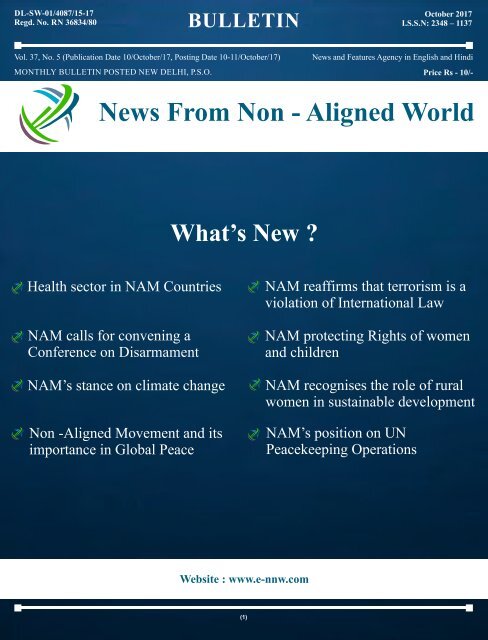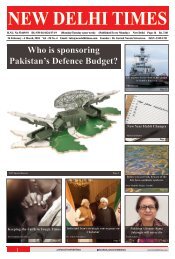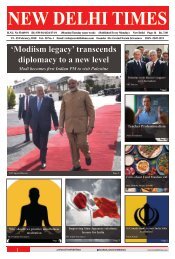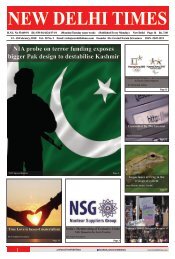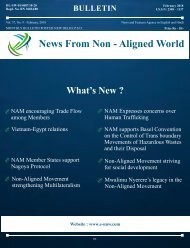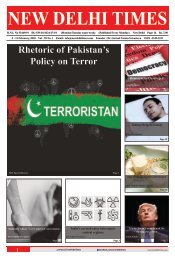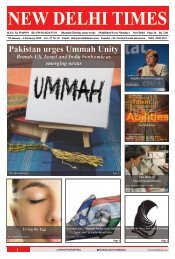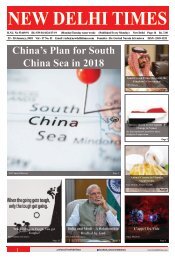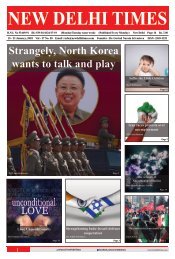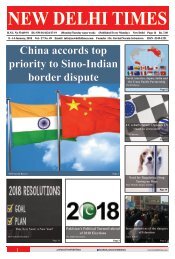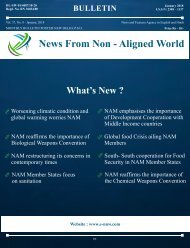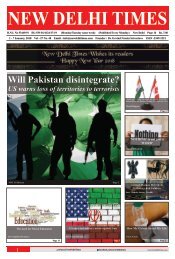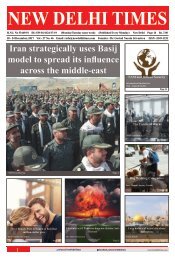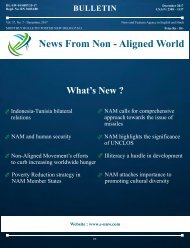10 October 2017_final
Create successful ePaper yourself
Turn your PDF publications into a flip-book with our unique Google optimized e-Paper software.
DL-SW-01/4087/15-17<br />
Regd. No. RN 36834/80<br />
BULLETIN<br />
<strong>October</strong> <strong>2017</strong><br />
I.S.S.N: 2348 – 1137<br />
Vol. 37, No. 5 (Publication Date <strong>10</strong>/<strong>October</strong>/17, Posting Date <strong>10</strong>-11/<strong>October</strong>/17)<br />
MONTHLY BULLETIN POSTED NEW DELHI, P.S.O.<br />
News and Features Agency in English and Hindi<br />
Price Rs - <strong>10</strong>/-<br />
News From Non - Aligned World<br />
What’s New ?<br />
Health sector in NAM Countries<br />
NAM calls for convening a<br />
Conference on Disarmament<br />
NAM’s stance on climate change<br />
Non -Aligned Movement and its<br />
importance in Global Peace<br />
NAM reaffirms that terrorism is a<br />
violation of International Law<br />
NAM protecting Rights of women<br />
and children<br />
NAM recognises the role of rural<br />
women in sustainable development<br />
NAM’s position on UN<br />
Peacekeeping Operations<br />
Website : www.e-nnw.com<br />
(1)
(2)
News From Non - Aligned World<br />
(3)
Vol. 37, No.5<br />
Date of Publishing -<strong>10</strong> <strong>October</strong> - 9 November, <strong>2017</strong><br />
I.S.S.N: 2348 – 1137<br />
Regd. No. RN 36834/80<br />
DL-SW-01/4087/15-17<br />
Dr.(Mrs.) Pramila Srivastava<br />
Dr. Ankit Srivastava<br />
Himanshu Sharma<br />
Sujay Dhawan<br />
Pawan Kumar<br />
- Editor-in-Chief<br />
- Editor<br />
- Deputy Director, Research<br />
- Director, Administration<br />
- Director, Development<br />
News From Non - Aligned World<br />
A-2/59, Safdarjung Enclave<br />
New Delhi - 1<strong>10</strong>029<br />
(India)<br />
Ph. No. : +91-11-26<strong>10</strong>2520<br />
Fax : +91- 11- 26196294<br />
E-mail<br />
Web<br />
: info@e-nnw.com<br />
: www.e-nnw.com<br />
Owner, Printer & Publisher<br />
Printed at<br />
Published at<br />
: Dr.(Mrs.)Pramila Srivastava<br />
: Sudhir Printers, 151, Desh Bandhu Gupta Market,<br />
Karol Bagh, New Delhi - 1<strong>10</strong>005<br />
: A-2/ 59, Safdarjung Enclave, New Delhi -1<strong>10</strong> 029 (INDIA)<br />
(4)
Index<br />
• Health sector in NAM Countries Pg.08<br />
• NAM calls for convening a Conference on Disarmament Pg.09<br />
• NAM’s stance on climate change Pg.<strong>10</strong><br />
• Non -Aligned Movement and its importance in Pg.11<br />
Global Peace<br />
• NAM reaffirms that terrorism is a violation of Pg.12<br />
International Law<br />
• NAM protecting Rights of women and children Pg.13<br />
• NAM recognises the role of rural women in Pg.14<br />
sustainable development<br />
• NAM’s position on UN Peacekeeping Operations Pg.15<br />
(5)
(6)
From Editor’s Desk<br />
The principles of world peace, respect for law, establishing a just<br />
international order based on the rule of law and disarmament<br />
have been reiterated by the Non-Aligned Movement not only<br />
in its summits and conferences but also in the United Nations<br />
and other multilateral organisations.<br />
The Movement has expressed its concerns over the rising act of<br />
terrorism and firmly believes that acts of terrorism constitute a<br />
blatant violation of international law. As regards disarmament,<br />
NAM has been strongly advocating for convening a conference<br />
on disarmament.<br />
NAM has also taken cognizance of the social and economic<br />
challenges faced by the developing world. NAM Member States<br />
have undertaken a series of measures to achieve the goal<br />
of gender equality and promote the role of rural women in<br />
development activities.<br />
Dr. (Mrs.) Pramila Srivastava<br />
Editor - in - Chief<br />
(7)
News From Non -Aligned World<br />
Health sector in NAM Countries<br />
By IINS Research Team<br />
Non-Aligned Movement has long stood for the accord<br />
and harmony of developing countries as they continue<br />
their common journey in providing better lives to their<br />
people. Among other things that NAM has done for the<br />
improvement and upliftment of its member countries<br />
is its longstanding emphasis that the enjoyment of<br />
the highest attainable standard of health is among<br />
the most basic rights of every human being and each<br />
nation should be able to fulfil them.<br />
education, sustainable energy, water and sanitation,<br />
and climate change (adaptation and mitigation) as<br />
much as by preventing and treating diseases and is<br />
largely dependent on affordable, accessible health care<br />
and medicines.<br />
4. Recognizing that progress in prevention and control<br />
of non-communicable diseases has been insufficient<br />
and highly uneven and increased efforts are essential.<br />
Through its annual ministerial meetings on health,<br />
NAM has served as a vital tool with which developing<br />
countries are able to coordinate their positions in further<br />
pursuing their efforts to strengthen coordinated global<br />
action on global health issues and to boost the ability of<br />
the World Health Organization(WHO) to deliver on and<br />
be more receptive to the needs of developing countries<br />
in the health sector.<br />
Recognizing the increasing outbreaks in the Member<br />
State nations demonstrates the urgency for a unified<br />
collaboration and assistance to bolster national efforts<br />
in order for all countries to develop strong, resilient,<br />
sufficiently funded and integrated health systems,<br />
including establishment of the core capacities of the<br />
International Health Regulations, and having the<br />
capacity for health-related emergency preparedness<br />
and progress that promotes universal, even-handed<br />
access to health services and ensures reasonable,<br />
quality service delivery.<br />
Non-Aligned Movement lays down several key guidelines<br />
for the better functioning of the health sectors in its<br />
member states. It also urges them to not only adopt<br />
them but efficiently incorporate them as a part of their<br />
daily routine to achieve much healthier results.<br />
1. Investments to build systems that are grounded<br />
in primary health care and universal health coverage<br />
and proficient in responding to varied and unforeseen<br />
challenges that could crop up in the future.<br />
2. Endorse ‘Universal Health Coverage’ to address<br />
affordability, enhance accessibility and avoid financial<br />
hardship for people who need healthcare, regardless of<br />
their ethnicity and socio-economic status.<br />
3. Acknowledge that good health is determined by<br />
many aspects of development including poverty,<br />
5. Stress on the WHO’s role in ensuring availability of<br />
affordable, quality, safe, efficacious medicines.<br />
6. Emphasizing the importance of sustained<br />
multi-sectoral, cost-effective and population-wide<br />
interventions in order to reduce impact of the risk<br />
factors of common non-communicable diseases through<br />
the implementation of, inter alia, national policies and<br />
plans as well as international agreements and strategies<br />
by involving all relevant stakeholders at all levels from<br />
“Non-Aligned Movement lays down several key<br />
guidelines for the better functioning of the health<br />
sectors in its member states. It also urges them<br />
to not only adopt them but efficiently incorporate<br />
them as a part of their daily routine to achieve<br />
much healthier results”<br />
across the globe. NAM Ministers of Health convene<br />
continuous meetings to keep tabs on work done,<br />
improvements and also to chalk out scope of further<br />
work that can be done to improve the situation. These<br />
guidelines have aided the member states in achieving a<br />
much healthier environment which not only facilitates<br />
better health services and are easily accessible but also<br />
promote a healthy lifestyle which is not a far-fetched<br />
dream anymore.<br />
However, there are still concerns that loom over NAM<br />
countries given that much of the development in the<br />
health sector is urban, marginalizing the rural folks<br />
and their chance to develop at a similar pace. For this<br />
not only setting up of such facilities would suffice but<br />
the need to create awareness is also a key unit for the<br />
overall development of the states as a whole. Therefore,<br />
though health sectors in NAM countries have seen a<br />
considerable growth and development, there is still<br />
scope for betterment to bring about an all-round<br />
transformation for its people.<br />
<strong>10</strong> <strong>October</strong> - 9 November, <strong>2017</strong><br />
(8)
NAM calls for convening a Conference<br />
on Disarmament<br />
By Dr. Ankit Srivastava, Editor<br />
Since the inception of the Non Aligned Movement, the<br />
NAM Member States have adhered to the principle<br />
of nuclear disarmament and non-proliferation.<br />
The stance on disarmament has been a recurring<br />
theme at all the NAM summits. In multilateral<br />
forums like the United Nations too, NAM has been<br />
actively participating in the non-proliferation initiatives.<br />
On 26th September <strong>2017</strong>, in the High Level Meeting<br />
of the UN General Assembly on the Total Elimination<br />
of Nuclear Weapon, NAM Member States supported<br />
the convening of an international conference on<br />
nuclear disarmament at the United Nations. Speaking<br />
on behalf of the Non-Aligned Movement, Jorge<br />
Arreaza, Venezuela’s Minister for Foreign Affairs<br />
remarked: “As long as nuclear weapons exist, the<br />
risk of proliferation exist”. Arreaza said that the total<br />
and absolute elimination of nuclear weapons must<br />
be achieved because the use of such weapons was a<br />
crime against humanity. In making efforts to stop the<br />
spread of nuclear weapons, NAM reaffirmed support<br />
for using multilateral diplomacy in the negotiations<br />
to reach disarmament and non-proliferation goals.<br />
India, associating itself with the Non-Aligned Movement<br />
said that it was committed to the goal of a nuclearweapon-free<br />
world and the complete elimination<br />
of nuclear weapons. Syed Akbaruddin, India’s<br />
Permanent Representative to the UN remarked:<br />
“There is a need for a meaningful dialogue among all<br />
States possessing nuclear weapons to build trust and<br />
confidence” and to reduce the salience of such weapons<br />
in international affairs and security doctrines”.<br />
India reiterated NAM’s principled position that the<br />
Conference on Disarmament was the only appropriate<br />
platform for negotiations. India stood ready to<br />
commence talks within that body aimed at developing<br />
a comprehensive nuclear weapons convention along<br />
the lines of the Convention on the Prohibition of the<br />
Development, Production, Stockpiling and Use of<br />
Chemical Weapons and on Their Destruction. India<br />
also supported beginning talks on a fissile material<br />
cut-off treaty. Noting that increasing restraints<br />
on the use of nuclear weapons would reduce the<br />
probability of their use — whether deliberate,<br />
unintentional or accidental — India pointed out that<br />
News From Non -Aligned World<br />
it’s resolutions in the First Committee on measures<br />
to reduce nuclear danger and on a convention on<br />
the prohibition of the use of nuclear weapons had<br />
received broad support among Member States.<br />
Bangladesh, associating itself with the statement<br />
of the Non-Aligned Movement pressed deep concerns<br />
over repeated nuclear weapons testing by a Member<br />
State in violation of relevant Security Council<br />
resolution and concerned to scale down provocations<br />
and de-escalate tensions in the interest of finding<br />
solutions through dialogue and negotiations.<br />
Jamaica voiced support for the Treaty on the Prohibition<br />
of Nuclear Weapons as an important addition to the<br />
world’s existing disarmament instrument and called for<br />
a United Nations high-level international conference on<br />
nuclear disarmament to be convened no later than 2018.<br />
Jamaica expressed concerns at the additional risks<br />
posed by non-State actors with the means, resolve and<br />
determination to secure of weapons of mass destruction.<br />
Chile said that that coexistence in a world without nuclear<br />
weapons was possible, and that maintaining peace<br />
and security without resorting to nuclear deterrence<br />
was not only possible, but an ethical imperative.<br />
Timor Leste associated itself with NAM’s position on<br />
convening a conference on disarmament said that the<br />
world was facing numerous challenges and injustices,<br />
including threats from such weapons, which were<br />
“part of our daily reality”. Recalling that the world<br />
had once witnessed the catastrophic effects of the<br />
use of nuclear weapons, Timor Leste stressed that<br />
all methods should be employed to ensure that they<br />
were never used again, emphasizing that both dialogue<br />
and prevention would be critical in that regard.<br />
NAM Member States have reaffirmed the importance of<br />
the Conference on Disarmament as the sole multilateral<br />
negotiating body on disarmament, and reiterated their<br />
call to convene such a conference at its earliest by 2018<br />
in order to agree on a balanced and comprehensive<br />
program of work by, inter alia, establishing an<br />
ad hoc committee on nuclear disarmament as<br />
soon as possible and as the highest priority.<br />
(9)<br />
<strong>10</strong> <strong>October</strong> - 9 November, <strong>2017</strong>
News From Non -Aligned World<br />
NAM’s stance on climate change<br />
By IINS Research Team<br />
Non-Aligned Movement (NAM) as an idea was developed<br />
by three world-leaders:Nehru of India, Tito of Yugoslavia<br />
and Naseer of Egypt. In the beginning NAM consisted of<br />
25 members in1961; it has now expanded to include<br />
115 developing countries which constitute nearly<br />
two thirds of the United Nations. The Non-Aligned<br />
Movement was born out of a desire not to become<br />
involved in the East-West ideological confrontation and<br />
instead focused on important matters that lay in hand,<br />
national independence struggles, the alleviation of<br />
poverty and economic development of under-developed<br />
and developing nations. These principles were adopted<br />
at the founding non-aligned summit in 1961.<br />
The <strong>10</strong>th summit in Jakarta in 1992 adopted the<br />
Jakrata Declaration laid out the future direction and<br />
priorities of the Movement. In the past, NAM was purely<br />
a political Movement; today economic co-operation<br />
between member states is given priority. Problems like<br />
the increasing population ,unemployment, foreign dept.<br />
and poverty are identified as the priorities. Another<br />
topic that needs to be addressed by the NAM member<br />
states is ‘Climate Change’ .<br />
Maldives, Bangladesh and seven out of ten countries<br />
in the African continent will be submerged due to the<br />
rising sea level and changing climate.<br />
In the year 2009, NAM member states presented<br />
themselves as an outspoken critic of any legislation that<br />
wouldn’t cap carbon dioxide emissions and establish a<br />
national program for trading pollution allowances. On<br />
25 May 2011 at NAM’s 50th Anniversary meeting in<br />
Bali, the United Nations Secretary General Ban-Ki-Moon<br />
called on the Non-Aligned Movement compromising<br />
of more than <strong>10</strong>0 countries to assist in “urgent<br />
global action” to combat the threat posed by climate<br />
change. The UN secretary General urged the Non-<br />
Aligned countries to come to a resolution on the future<br />
of the Kyoto protocol and on ways to engage the NAM<br />
member states in an emerging global framework.<br />
The UN Secretary General further called the NAM<br />
Member States to curb emissions and strengthen<br />
climate resilience. According to the UN Secretary<br />
General, it was in the best interests for developing<br />
countries if NAM worked in support of the United<br />
Nations in areas of energy access, energy efficiency and<br />
clean efficiency.<br />
“Among the developing countries, the less<br />
developed countries are especially vulnerable<br />
because a large share of their economic is in<br />
climate-sensitive sectors and their adaptive<br />
capacity is low due to limited human, financial<br />
and natural resources and institutional and<br />
technical capacity. As has been repeatedly<br />
addressed, the third world nations will be<br />
the first to face adversity due to our changing<br />
natural environment”<br />
Climate change is increasingly recognized as the driver<br />
of change to the world’s biodiversity, ecosystems and<br />
oceans. It is one of the most important global problems<br />
with unique characteristics. Among the developing<br />
countries, the less developed countries are especially<br />
vulnerable because a large share of their economic is<br />
in climate-sensitive sectors and their adaptive capacity<br />
is low due to limited human, financial and natural<br />
resources and institutional and technical capacity. As<br />
has been repeatedly addressed, the third world nations<br />
will be the first to face adversity due to our changing<br />
natural environment. Costal nations like Sri Lanka,<br />
On 27th September 2013, President of the<br />
UN general Assembly Dr. John Ashe said that<br />
against a backdrop of increasing impact of climate<br />
change, inequality between and among countries<br />
and more than a billion people living in extreme<br />
poverty, the cooperation between NAM countriesfounded<br />
on a virtue of solidarity was imperative<br />
for improving the socio-economic development for<br />
their citizens. The Non Aligned Movement should<br />
play a more constructive role with regard to climate<br />
change as members from the Non-Aligned world are<br />
most vulnerable from threats emanating due to the<br />
phenomenon. The World Bank has made a list of the main<br />
five threats arising from the climate change: droughts,<br />
floods, storms, rising sea levels, and agricultural<br />
products deficit. Not surprisingly, members of NAM<br />
have topped the list of the 12 countries at the highest<br />
risk. NAM must pursue an effective policy to reduce<br />
the hazards of climate change within a multilateral<br />
framework, as environment policy is not an isolated<br />
object and cooperation between developing countries<br />
in this regards will result in positive spillover effects<br />
in achieving the other Millennium Development Goals<br />
(MDGs) and providing the basis for livelihoods, health<br />
and security, particularly for the poor.<br />
<strong>10</strong> <strong>October</strong> - 9 November, <strong>2017</strong><br />
(<strong>10</strong>)
Non -Aligned Movement and its importance<br />
in Global Peace<br />
By IINS Research Team<br />
International organisations were formed after the<br />
Second World War in cold war situation by the States<br />
that did not seek to have any align with either the<br />
United States or the USSR, but were independent or<br />
neutral. NAM was set with a primary goal that every<br />
country should have its independent policy. It provided<br />
a new twist in international politics and served as a<br />
protector for many developing countries to maintain<br />
their independence from the competing claims of the<br />
two superpowers. It set as a vehicle for independent<br />
countries to escape itself from the race of militarization<br />
of the two countries at the time of cold war.<br />
The Bandung conference in 1955 of Asian and African<br />
country hosted by Indonesian President was marked as<br />
the significant milestone for the development of NAM<br />
which adopted the principle of maintaining world peace<br />
and cooperation. Subsequently, the first meeting for<br />
the NAM Summit Conference of Belgrade was held in<br />
1961 with participants from 25 countries.<br />
There were many positive and negative factors that<br />
influenced the formation of the movement. Identifying<br />
right of independent judgement, struggle against<br />
imperialism and neo-colonialism and use of moderation<br />
in relations with all big powers served as the three basic<br />
elements that influenced the approach of NAM.<br />
Post-Cold war, newly independent nations like Asia and<br />
Africa were not ready to compromise with their freedom<br />
and were deeply enriched with the feeling of nationalism.<br />
The two developing countries had economic crisis and<br />
were not ready to become allied with one of the bloc<br />
and become fully dependent. They needed a platform<br />
to come together, discuss their equal social, racial and<br />
political problems and to bring development in their<br />
countries. Even after the formation of NAM, the cold<br />
war was at its peak and military alliances was the key<br />
feature for the two power blocs to increase their military<br />
power and support from smaller and less powerful<br />
countries.<br />
Therefore, the nations decided to go for the policy of<br />
NAM that provided a platform for the two developing<br />
nations to avoid the military alliance and to become a<br />
fully independent foreign policy. Fear of overpowered<br />
by the two power blocs made them united and opt for<br />
NAM which had some conditions for joining the NAM<br />
such as<br />
• peace loving country<br />
• having an independent foreign policy<br />
• having sovereign state<br />
• non-aligned with any bloc<br />
• mutual respect for every nation’s sovereignty<br />
and territory<br />
• non-interference in internal affairs of other<br />
countries<br />
• avoidance of aggression and to promote equality<br />
• Cooperation and benefit for all nations.<br />
News From Non -Aligned World<br />
These principles were known as the <strong>10</strong> principles<br />
of Bandung which were later adopted as the main<br />
objectives of NAM.<br />
With the present scenario of the world in a slow yet<br />
steady pace, from uni-polar to multi polar world; NAM<br />
is still relevant in today’s world. The NAM organization<br />
itself is acting solid as ever, acting strong; giving a<br />
voice to the developing country so as to promote peace<br />
and cooperation. India’s first Prime Minister Jawahar<br />
Lal Nehru and prominent advocate of Non Aligned<br />
Movement delivered a speech explaining why every<br />
country should follow the Non Aligned Movement. He<br />
said, “The preservation of peace…it is in the pursuit<br />
of this policy that we have chosen the path of Non<br />
Alignment in any military or like pact of alliance.”<br />
In today’s era, with a total of 17 summits organised by<br />
the members to make the movement stronger and fulfil<br />
the goals of the founding members, NAM has a total<br />
of 120 members, 17 observer states and 15 observer<br />
organizations, representing nearly two third of the UN<br />
members, or about 55 percent of the world population<br />
influencing in its decision making. NAM is considered a<br />
Contd.....On Page 16<br />
(11)<br />
<strong>10</strong> <strong>October</strong> - 9 November, <strong>2017</strong>
News From Non -Aligned World<br />
NAM reaffirms that terrorism is a violation<br />
of International Law<br />
By IINS Research Team<br />
Non-Aligned Movement has always condemned any acts<br />
of terrorism in all its forms and manifestations. The<br />
17th NAM Summit held in 2006 Venezuela condemned<br />
all forms of incitement to terrorism, under whatever<br />
guise of justification, resulting in the loss of life and<br />
the destruction of private and public property and<br />
emphasized the need to combat the violent extremist<br />
ideology inciting terrorism irrespective of its origin.<br />
NAM has categorically stated that acts of terrorism<br />
constitute a violation of international law. At the<br />
recent United Nations Security Council Ministerial<br />
open debate on “Measures to eliminate international<br />
terrorism”, held in <strong>October</strong> <strong>2017</strong> in New York, Iran’s<br />
Ambassador to the United Nations Gholam Ali<br />
Khoshroo, speaking on behalf of NAM stated: “The<br />
Non-Aligned Movement reaffirms that terrorist acts<br />
constitute a flagrant violation of international law,<br />
including international humanitarian and human<br />
rights law, in particular, the right to life, leading to<br />
the lack of the full enjoyment of human rights and<br />
fundamental freedoms of peoples. Such acts endanger<br />
the territorial integrity and stability of States as well as<br />
national, regional and international security, destabilise<br />
legitimately constituted governments or the prevailing<br />
constitutional order and political unity of States, affect<br />
the stability of nations and the very basis of societies,<br />
create adverse consequences on the economic and<br />
social development and cause the destruction of the<br />
physical and economic infrastructure of States”.<br />
NAM has reaffirmed its support for the provisions<br />
contained in General Assembly resolution 46/51 of<br />
9 December 1991 which unequivocally condemns,<br />
as criminal and unjustifiable, all acts, methods and<br />
practices of terrorism wherever and by whomever<br />
committed, including those which jeopardize the<br />
friendly relations among States and their security<br />
and calls upon all States to fulfil their obligations<br />
under international law to refrain from organizing,<br />
instigating, assisting or participating in terrorist acts in<br />
other States, or acquiescing in or encouraging activities<br />
within their territory directed towards the commission<br />
of such acts.<br />
At the UNSC Ministerial debate, Mr Khusroo also<br />
reiterated the position of NAM that terrorism cannot and<br />
should not be associated with any religion, nationality,<br />
civilization or ethnic group, and these attributions<br />
should not be used to justify terrorism or counterterrorism<br />
measures that include, inter alia, profiling of<br />
terror suspects and intrusion on individual privacy.<br />
NAM has further urged all States, consistent with<br />
the UN Charter, to fulfil their obligations under<br />
international law and international humanitarian<br />
law in combating terrorism, including by prosecuting<br />
or, where appropriate, extraditing the perpetrators<br />
of terrorist acts; by preventing the organisation,<br />
“NAM has reaffirmed its support for the provisions<br />
contained in General Assembly resolution<br />
46/51 of 9 December 1991 which unequivocally<br />
condemns, as criminal and unjustifiable, all acts,<br />
methods and practices of terrorism wherever and<br />
by whomever committed, including those which<br />
jeopardize the friendly relations among States”<br />
instigation or financing of terrorist acts against other<br />
States from within or outside their territories or by<br />
organisations based in their territories; by refraining<br />
from organising, instigating, assisting, financing or<br />
participating in terrorist acts in the territories of other<br />
States; by refraining from encouraging activities within<br />
their territories directed towards the commission<br />
of such acts; by refraining from allowing the use of<br />
their territories as sanctuaries and safe havens or for<br />
planning, training or financing for such acts; or by<br />
refraining from supplying arms or other weapons that<br />
could be used for terrorist acts in other State.<br />
Mr Khusroo, speaking on behalf of NAM also encouraged<br />
all States, which have not yet done so, to consider ratifying<br />
or acceding to the thirteen international instruments<br />
relating to combating terrorism. The Movement also<br />
called upon all States to observe and implement the<br />
provisions of all international instruments as well as<br />
regional and bilateral instruments relating to terrorism<br />
to which they are party. The Movement also reiterated<br />
its call for an International Summit Conference under<br />
the auspices of the UN to formulate a joint organised<br />
response of the international community to terrorism<br />
in all its forms and manifestations including identifying<br />
its root causes.<br />
<strong>10</strong> <strong>October</strong> - 9 November, <strong>2017</strong><br />
(12)
NAM protecting Rights of women<br />
and children<br />
By IINS Research Team<br />
Non-Aligned Movement represents a very large<br />
majority of humanity of this earth. It has traditionally<br />
fought against imperialism, colonialism, racism, neoimperialism,<br />
and neo-colonialism, and against all forms<br />
of prejudice and dominance. It has fought for an evenhanded<br />
social and economic order, which includes its<br />
fight for women and children of the world.<br />
Women and their condition has always been a matter<br />
of major concern for societies and leaders, and more so<br />
has been the case in modern times. With the increasing<br />
threat towards this gender and the upsurge in inequality<br />
towards them has got NAM involved within its capacity<br />
to protect and further empower the kind. As women pay<br />
a crucial role in economic and social development of a<br />
family and on a larger level a nation, managing around<br />
News From Non -Aligned World<br />
forms of abuse, violence, neglect as well as exploitation.<br />
Furthermore, the progress of a country depends directly<br />
on the well being of its children.<br />
NAM has held ministerial meetings on the advancement<br />
of women discussing vital issues related to women and<br />
their further development. In this context the ‘Doha<br />
Declaration on the Family’ is termed as the first step<br />
towards the subject matter as it set fundamental<br />
principles regarding family interests and rights.<br />
Further in the ministerial meetings NAM has<br />
concentrated on matters like protecting women against<br />
wars and diseases, giving them better education, while<br />
granting them equal political, social and economic<br />
rights, also enforcing laws to protect them against<br />
domestic abuse.<br />
“NAM has been ardent in bringing a radical change<br />
in the condition of women calling on countries to<br />
end discriminatory laws, also asking nations to<br />
commit themselves to take series of actions to<br />
empower women. It won’t be wrong to say that<br />
this endeavour has brought a certain change in<br />
various countries bringing governments together<br />
for the agenda, with countries like Qatar, Gabon,<br />
Madagascar, Vietnam, and Egypt reaching to their<br />
women, resulting in better conditions for them”<br />
70-80% of food production, processing and marketing<br />
and managing small businesses and the lives of the ones<br />
related to her, NAM endeavours to not only examine<br />
the issues of women and what is holding them back by<br />
organising global conferences on women’s issues, also<br />
plays a lead role worldwide in taking practical steps<br />
towards the process of “empowering women”.<br />
Children are the nation’s most valuable asset and our<br />
most precious treasure. They deserve a safe, healthy<br />
and conducive environment to grow into leaders of<br />
tomorrow it is therefore necessary that values for a<br />
better future are inculcated in their education and<br />
upbringing. This issue which has been the centre of<br />
concentrated efforts before has become a topic of major<br />
discussion amongst the chief issues discussed by<br />
members of the Non–Aligned Movement in their recent<br />
summits. This includes protecting children from all<br />
It also focused on issues such as ways to increase their<br />
capacity and achieving gender equality in addition to<br />
eliminating all forms of discrimination against them,<br />
ensuring measures to strengthen the role of women<br />
in decision making politically and also in the field of<br />
technology.<br />
NAM has again and again stressed on critical issues of<br />
how vital women are for a nation to fight crisis, the need<br />
to cease any sort of violence against them, increasing<br />
their power and involvement in public as well as<br />
political scenarios, while emphasising on education for<br />
women. Hence, proving NAM’s serious commitment to<br />
the cause of women and their development worldwide.<br />
NAM has been ardent in bringing a radical change in<br />
the condition of women calling on countries to end<br />
discriminatory laws, also asking nations to commit<br />
themselves to take series of actions to empower women.<br />
It won’t be wrong to say that this endeavour has<br />
brought a certain change in various countries bringing<br />
governments together for the agenda, with countries<br />
like Qatar, Gabon, Madagascar, Vietnam, and Egypt<br />
reaching to their women, resulting in better conditions<br />
for them.<br />
NAM directs the community as a whole to strengthen<br />
the overall capacity of society in caring for children and<br />
Contd.....On Page 16<br />
(13)<br />
<strong>10</strong> <strong>October</strong> - 9 November, <strong>2017</strong>
News From Non -Aligned World<br />
NAM recognises the role of rural women in<br />
sustainable development<br />
By IINS Research Team<br />
The new Sustainable Development Goals (SDGs) have<br />
gender equality and women’s empowerment at their<br />
core. It has been acknowledged that for the SDGS<br />
to be truly transformational, rural women are a key<br />
constituency in assisting national governments to<br />
achieve inclusive and gender-equitable results.<br />
In <strong>October</strong> 2015, former United Nations Secretary-<br />
General Ban Ki-moon once remarked, “Rural women<br />
are the backbone of sustainable livelihoods and provide<br />
food security for their families and communities”.<br />
The then UN Women Executive Director Phumzile<br />
Mlambo-Ngcuka also reaffirmed that rural women play<br />
a key role in underpinning sustainable development<br />
and further stressed that following the framework of<br />
Agenda 2030 will help in accelerating progress for rural<br />
women. Rural women play a critical role in supporting<br />
their households in the achievement of food and<br />
nutrition security, in improving rural livelihoods and in<br />
generating income and overall well-being. Rural women<br />
account for a substantial proportion of the agricultural<br />
labour force, perform most of the unpaid care work<br />
and are significant actors in food production as well<br />
as in the agricultural, forestry, fisheries, and livestock<br />
sector.<br />
Non-Aligned Movement too recognises the significant<br />
role that rural women play in the realisation of the<br />
development goals. NAM has reaffirmed the vital role of<br />
women and the need for their full and equal participation<br />
and leadership in all areas of sustainable development,<br />
as well as resolving to undertake legislative and<br />
administrative reforms to give women equal rights with<br />
men to economic resources, equal access to ownership<br />
and control over land and other forms of property,<br />
credit, inheritance, natural resources and appropriate<br />
new technology. The Movement has also recognized the<br />
importance of promoting, protecting and enjoyment of<br />
all human rights and fundamental freedoms by rural<br />
women and girls, including the right to development.<br />
NAM has welcomed the adoption of the Resolution<br />
70/132 on improvement of the situation of women in<br />
rural areas which states that the empowerment of rural<br />
women is critical for the realization of their rights and to<br />
secure the well-being of their families and communities.<br />
Their contributions are vital to agricultural and rural<br />
development and local and national economies. Rural<br />
women are key to the success of virtually all<br />
the proposed sustainable development goals, not<br />
only proposed goal 5, to achieve gender equality and<br />
empower all women and girls, but also across<br />
the framework, particularly synergies with goals 1<br />
(end poverty in all its forms everywhere) and 2 (end<br />
hunger, achieve food security and improved nutrition<br />
and promote sustainable agriculture)<br />
NAM Member States have reiterated the importance<br />
of empowering rural women as critical agents for<br />
“Non-Aligned Movement too recognises<br />
the significant role that rural women<br />
play in the realisation of the development<br />
goals. NAM has reaffirmed the vital role<br />
of women and the need for their full and<br />
equal participation and leadership in all<br />
areas of sustainable development”<br />
advancing agricultural and rural development In<br />
realisation of this, number of NAM Member States<br />
has undertaken a series of initiatives to promote the<br />
development and welfare of women in the rural areas and<br />
which is yielding positive results. Here, we focus on two<br />
NAM countries- namely India and Bangladesh. India’s<br />
rural development programs have helped organize 22<br />
million women into Self-Help Group (SHGs). A notable<br />
program in India has been Support to Training and<br />
Employment Programme (STEP) which aims to enable<br />
groups of women to take up employment-cum- income<br />
generation program and provide support for further<br />
improving training and employment conditions of<br />
women. The target group includes the marginalised<br />
asset less rural women. In Bangladesh, rural women<br />
are now engaged in rural development works across<br />
the country as labourers. Further, through the Kallyani<br />
scheme, Bangladesh is bringing the internet to isolated<br />
rural areas through a social enterprise that empowers<br />
women to become entrepreneurs. The women, known<br />
as Kallyani, travel between villages via bicycle and<br />
bring with them a laptop, tablet, smartphone, Wi-Fi<br />
hotspot and digital camera that villagers can use. The<br />
women have also been trained to give simple legal and<br />
medical advice.<br />
<strong>10</strong> <strong>October</strong> - 9 November, <strong>2017</strong><br />
(14)
NAM’s position on UN<br />
Peacekeeping Operations<br />
Since its inception, the Non-Aligned Movement has<br />
played a significant contribution towards maintaining<br />
international peace and security. NAM regards<br />
peacekeeping as the flagship activity of the United<br />
Nations. NAM Member States contribute to 88 per<br />
cent of all UN peacekeeping personnel deployed on the<br />
field. The Movement has adopted a principled position<br />
concerning UN peacekeeping operations.<br />
NAM believes that the primary responsibility for the<br />
maintenance of international peace and security rests<br />
with the UN and that the role of regional arrangements,<br />
in that regard, should be in accordance with Chapter<br />
VIII of the Charter, and should not in any way substitute<br />
the role of the UN, or circumvent the full application<br />
of the guiding principles of the UN peacekeeping<br />
operations.<br />
At the 8033rd meeting of the UN Security Council held<br />
on 29th August <strong>2017</strong>, NAM put forwards its principled<br />
position on the UN peacekeeping operations. Venezuela,<br />
speaking on behalf of the Non-Aligned Movement<br />
emphasised that all mandated peacekeeping tasks<br />
must be accompanied by a parallel, comprehensive<br />
and inclusive peace process and based on national<br />
ownership and the consent and adherence of the<br />
concerned parties. NAM stresses that such operations<br />
are not a substitute for addressing the root causes<br />
of conflict, among them poverty, hunger, inequality,<br />
human rights violations and mismanagement of<br />
natural resources. NAM also emphasizes the importance<br />
of respecting States’ sovereignty, territorial integrity<br />
and independence, reiterating that the principles of<br />
peacekeeping - consent of the parties, impartiality and<br />
the non-use of force expect in self-defence - are critical to<br />
the success of peace operations.<br />
NAM believes that increasing demand for peacekeeping<br />
missions and the multidimensional nature of contemporary<br />
operations call for a more robust partnership between<br />
the United Nations and regional organizations.<br />
In this respect, the African Member States of NAM<br />
attach great significance to the United Nations Security<br />
Council resolution 2320 (2016) which acknowledges the<br />
need for more cooperation between the African Union<br />
handled peace operations and the United Nations and<br />
News From Non -Aligned World<br />
By Dr. Pawan Mathur<br />
stresses the need to enhance the predictability,<br />
sustainability and flexibility of financing for African<br />
Union-led peace support operations authorized by the<br />
Security Council and under the Security Council’s<br />
authority consistent with Chapter VIII of the UN<br />
Charter. South Africa has called for United Nations<br />
assessed contributions to be used for financing African<br />
Union-led peace support operations authorized by the<br />
UN Security Council.<br />
Botswana while supporting resolution 2282<br />
(2016) has noted that peacekeeping operations<br />
should complement existing national, regional and<br />
“In this respect, the African Member States of<br />
NAM attach great significance to the United<br />
Nations Security Council resolution 2320<br />
(2016) which acknowledges the need for<br />
more cooperation between the African Union<br />
handled peace operations and the United<br />
Nations and stresses the need to enhance the<br />
predictability, sustainability and flexibility of<br />
financing for African Union-led peace support<br />
operations authorized by the Security Council<br />
and under the Security Council’s authority<br />
consistent with Chapter VIII of the UN Charter.<br />
South Africa has called for United Nations<br />
assessed contributions to be used for financing<br />
African Union-led peace support operations<br />
authorized by the UN Security Council”<br />
international efforts aimed at advancing dialogue,<br />
strengthening national capacity and assisting<br />
institution. It may be mentioned here that Botswana<br />
had contributed troops and military personnel to<br />
operations in such places as Somalia, Rwanda, Darfur,<br />
Mozambique and Lesotho. In the latter two, as well as<br />
in the Democratic Republic of the Congo, it had played<br />
a mediating role, while its former President, Festus G.<br />
Mogae, was currently serving as Chairman of the Joint<br />
Monitoring and Evaluation Committee in South Sudan.<br />
NAM has also reiterated the importance of the Special<br />
Committee on Peacekeeping Operations, the only United<br />
Nations forum mandated to comprehensively review<br />
that question, advocating a structural and predictable<br />
(15)<br />
<strong>10</strong> <strong>October</strong> - 9 November, <strong>2017</strong>
News From Non -Aligned World<br />
approach to triangular consultation among the<br />
Council, the troop- and police-contributing countries<br />
and the Secretariat.<br />
NAM has emphasized that in the context of the<br />
comprehensive approach and the objective of a lasting<br />
peace and security, UN peacekeeping operations should<br />
be accompanied by a parallel and inclusive peace<br />
process that is well planned and carefully designed,<br />
supported by the consent and adherence of the parties<br />
concerned.<br />
The Movement has called for peacekeeping missions to<br />
be accompanied by the promotion of economic recovery,<br />
reintegration and capacity-building.<br />
In conducting UN peacekeeping operations, NAM has<br />
called for adherence to all relevant Council resolutions<br />
as well as consultations with concerned States —<br />
including host countries – and has stated that the<br />
priorities of the latter must be considered, especially<br />
when designing and devising mission mandates and<br />
exit strategies.<br />
Non -Aligned Movement and its......<br />
loose organizational structure with different economic<br />
and political interests. However, despite differences in<br />
interests and political outputs, the primary objective of<br />
all the members and organisations serves to maintain<br />
world peace and cooperation.<br />
Economic crisis and environmental pollution are the<br />
main issues of the world in today’s context. And with<br />
the failure of G8 to maintain their stand in crisis of<br />
global economic issues without support from developing<br />
nations, NAM can be the only organization for<br />
maintaining peace and can play a big role in controlling<br />
and changing the present international environment.<br />
Even after 50 years of its foundation, NAM strives to<br />
maintain world peace abiding by the rules of its founding<br />
principles, ideas and purpose that is to maintain peace.<br />
It promoted disarmament and prohibited invasion of<br />
any country.<br />
The rise of Third World Nations called the ‘Global South’<br />
after Second World War served crucial to the world<br />
politics as well as to the global governance. With great<br />
powers and in the process of becoming a centre for<br />
economic growth, it led to several problems. NAM served<br />
itself as a protector during such situation for these<br />
small developing countries and provided a platform for<br />
Contd.....from Page 11<br />
them to fight against the western leadership. Not just<br />
that, NAM also empowered the members of the state<br />
to be independent and take its own decision without<br />
external influence.<br />
NAM has a crucial role to play in destruction of neo<br />
colonial system, the struggle against attempts to<br />
divide the world into spheres, the aspiration to a new<br />
international order which would be based on equality,<br />
justice and peace through summit conference.<br />
At present, there are many external force acting in the<br />
direction of disturbing the oneness of humanity, the<br />
NAM can work itself in curing these destructive forces<br />
and create one world based on respect for each other’s<br />
sovereignty and territorial integrity, non-interference<br />
in internal affairs, use of non-violence and threats<br />
to settle international disputes and respect for the<br />
dignity of human personality and protecting the<br />
rights of all people.<br />
As the non-aligned system provides members<br />
a forum where they can discuss their common<br />
problems, evolve solution and work out position in<br />
tackling international problems of peace, security,<br />
development, environmental safety and human<br />
rights.<br />
NAM protecting Rights of.......<br />
keeping them safe. This includes activities directed at<br />
changing attitudes and social behaviours through advocacy<br />
and awareness campaigns, strengthening parenting<br />
skills, promoting the need for alternative forms of<br />
discipline rather than physical punishment, and<br />
sensitization on the impact of violence against<br />
Contd.....from Page 13<br />
children. It further urges NAM member states<br />
to build intervention services of primary, secondary<br />
and tertiary levels including mediation, counselling,<br />
community monitoring, and in extreme cases intervention<br />
of state in placement of the child in alternative care for<br />
their safety.<br />
<strong>10</strong> <strong>October</strong> - 9 November, <strong>2017</strong><br />
(16)
Regd. No. RN 36834/80<br />
Phone : 26<strong>10</strong>2520, 26<strong>10</strong>5846<br />
Fax : (91-11) 26196294<br />
E-mail : info@e-nnw.com<br />
Web : www.e-nnw.com<br />
NEWS FROM NON-ALIGNED WORLD<br />
(A News and Features Agency in English and Hindi)<br />
SUBSCRIPTION FORM<br />
Name:____________________________________________________________________________________<br />
Company/Department : ______________________________________________________________________<br />
Office Address : ___________________________________________________________________________<br />
________________________________________________________________________________________<br />
Phone : _______________________________________Fax : ____________________________________<br />
E- mail : ______________________________________Web : ___________________________________<br />
Residence Address : ________________________________________________________________________<br />
_______________________________________________________________________________________<br />
Phone : ______________________________________ E-mail : ___________________________________<br />
Date ......................... .............................................................<br />
Signature<br />
Note : Please fill the above form and send us for the continued delivery of NNW Bulletin.<br />
(17)
(18)
(19)
DL-SW-01/4087/15-17<br />
Regd. No. RN 36834/80 Total Pages - 20<br />
Publishing Date <strong>10</strong> <strong>October</strong>, <strong>2017</strong><br />
Posting Date <strong>10</strong>-11 <strong>October</strong>, <strong>2017</strong><br />
News From Non - Aligned World<br />
www.e-nnw.com<br />
Owner, Printer and Publisher: Dr. (Mrs.) Pramila Srivastava, Printed at Sudhir Printers, 151, Desh Bandhu Gupta Market,<br />
Karol Bagh, New Delhi - 1<strong>10</strong>005, Published at A-2/59 Safdarjung Enclave, New Delhi-1<strong>10</strong>029.<br />
(20)


